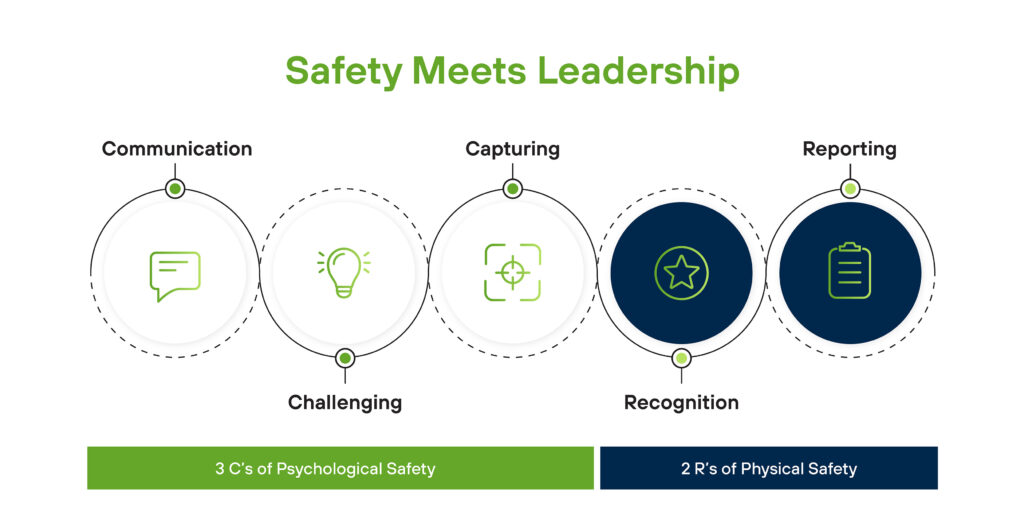Anton Guinea
Entrepreneur, Speaker, bestselling author, and founder of The Guinea Group of Companies. For over 15 years, Anton has helped leaders move their teams to become psychologically safe, physically safe and overall better versions of themselves.

Achieving Zero Harm by being a Psychological Safety Leader!

At its most basic level, psychological safety is about emotional safety, physical safety, and safe decision making.
It is about empowering people to express themselves, without fear of reprisal, without fear of retribution and fear of rebuttal. What psychologically safe leaders really do, is they ‘do hierarchy right’ (in the words of Amy Edmonson, arguably the founder of the psyc safety concept).
Doing hierarchy right means communicating to care and connect (not just to direct), accepting challenges (with an open mind) and capturing information (from team members – because they have all the ideas, and know their jobs better than leaders do). Communication, Challenging and Capturing are what we term the 3Cs.
And, it is not just at leader level that these things are important, it is at the team level, too, where team members need to be more accepting of others!
To take it one step further, psychological safety is ‘Social Safety‘. It is about understanding the social (or cultural) aspects of decision making, and knowing that; It is not just the individual you are dealing with… it is their perception of the social elements that are at play, that is most important.
Let me explain:
- People make safety decisions based on Social Influence (the words, actions, or just presence of others) – ‘How am I expected to act’?
- People make safety decisions based on the Social Situation (the specifics of the event, not the human) – ‘How would others act in this situation’?
- People make safety decisions based on the Social Cognition (how will this situation impact on me and others) – ‘Will I get rewarded and recognised or resented and ridiculed’?
For a while now, worker #safety has been all about the individual. It is time to make it about the social (work and cultural) aspects of the decision making process!
When it comes to physical safety, team members need to feel comfortable to make the big calls, like:
- Stopping jobs, if they feel unsafe
- Talking to co-workers, if they are working unsafely
- Reporting* incidents, because they know they won’t be blamed and sacked
- Recognising* great safe behaviour, because behaviour that is rewarded is repeated
*We term these the 2Rs

Why does it matter?
When your teams feel vulnerable enough to share their thoughts, their feelings, their ideas and their opinions … and not be ridiculed or put down (by their leader or their peers), you will know you have got a psychologically safe workplace!!!
Teams that share together, stay together!
Psychological safety has never been more important than it is in 2020, and into the future.
Take Netflix CEO Reed Hastings, as an example of a CEO who understands both the importance of people interaction (culture) and effective decision making (leadership). “In Netflix’s case, it seems that Hastings is keen to end remote work as soon as possible“. Hastings understands that remote work isn’t conducive to effective interaction, and idea sharing.
He goes on to say how important it is to “balance (the) desire to keep employees safe while maintaining the sort of in-person interactions that can define a company’s culture“. Psychological safety, and physical safety.
For Netflix, it is about communication, challenging the norms, and capturing innovative ideas (the 3 Cs)!
“They just don’t listen to us”
These would be some of the most common words I hear in coaching sessions. Last week, a client explained that “I don’t even mind if they don’t like my ideas or opinions; just don’t shoot me down, and just hear what I have got to say … you never know, it might even add some value”.
In a workplace where #psychologicalsafety is important, there is no fear associated with putting your ideas forward. There is no pushback or ridicule if the ideas don’t align with the leader’s.
In a psychologically safe organisation, workers are able to be vulnerable enough to ‘share without fear‘. To share openly and honestly. To share without blame and shame (thank you, Brene Brown).
And, when workers can share their ideas around staying physically safe, you will know you have developed a strong safety culture. Zero Harm is a real thing in these strong safety cultures.
And, in a psychologically safe organisation, not only do leaders listen, but team members do too. That is the key distinction around psychological safety. It is about teams and leaders listening to understand, not to respond, or to ridicule.
Here at TGG, we understand the importance of creating leaders and teams that listen (and communicate) to care and connect. These leaders and teams outperform their competition, and are more effective and efficient.
Contact us to find out how to achieve psychological safety in your teams!
#safetyleadership
#healthandsafety
#cultureofsafety
And please click the image below if you’d like to chat about what leadership means to you.
If you would like to learn more about Anton or The Guinea Group, please click here to book into Anton’s calendar, to:
UPGRADE your Mindset
UPSKILL your Leadership
UPLIFT your Teams
About Anton
Anton has dedicated his working life to helping leaders to upgrade their mindset, upskill their leadership, and uplift their teams! With a focus on helps leaders to better lead under pressure. Anton is an entrepreneur, speaker, consultant, bestselling author and founder of The Guinea Group. Over the past 19 years, Anton has worked with over 175+ global organisations, he has inspired workplace leadership, safety, and cultural change. He’s achieved this by combining his corporate expertise, education (Bachelor of HR and Psychology), and infectious energy levels.
Work With Anton!
Subscribe to our Newsletter
